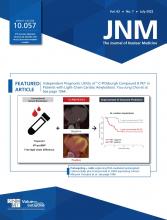Certification by the American Board of Nuclear Medicine (ABNM) is recognized by the U.S. Nuclear Regulatory Commission (NRC) as meeting the training and experience requirements to be an authorized user of byproduct material for medical use. The last time the ABNM’s certification process was reviewed by the NRC was in 2005, following publication of the final rule 10 CFR Part 35, “Medical Use of Byproduct Material Recognition of Specialty Boards,” defining the criteria such boards must meet before they could be recognized by the NRC or Agreement States (Fed Reg. 2005;70:16335). On January 11, 2021, the NRC Office of Nuclear Medicine Safety and Safeguards published Office Procedure 70-03, “Procedures for Recognizing, Monitoring, and Terminating Certification Process of Specialty Boards,” Section 3.1, “Monitoring Continued Satisfaction of Recognition Requirements.” The purpose was to provide “increased clarity” for the NRC on monitoring for continued satisfaction of the recognition criteria, guidance for determining whether NRC recognition should be terminated, and guidance for maintaining NRC-recognized board certifications on the NRC public website.
The ABNM received a letter on March 15, 2022, asking for confirmation that the ABNM continues to satisfy the recognition criteria for specialty board certification processes. The letter explained that the NRC was contacting all its recognized specialty boards per the procedure published in the preceding year. As part of the review, the NRC staff was evaluating the board’s publicly available website for changes that could affect recognition of the board’s certification process. The letter also noted that subsequent reviews will be performed on a 5-year basis.
The NRC review of the ABNM website is still underway. The ABNM has responded with proposed changes clarifying the training and work experience required for certification that conform to NRC rules to be an authorized user uses of byproduct material under 10 CFR 35.190 Training for uptake, dilution, and excretion studies; 10 CFR 35.290 Training for imaging and localization studies; and 10 CFR 35.390 Training for use of unsealed byproduct material for which a written directive is required.
Under 10 CFR 35.390, training and experience must include a minimum of 700 hours, all of which are applicable to the medical use of unsealed byproduct material requiring a written directive, including a minimum of 200 hours of classroom and laboratory training in accordance with 10 CFR 35.390(b), and supervised work experience. The 200 hours of classroom and laboratory training must include:
Radiation physics and instrumentation;
Radiation protection;
Mathematics pertaining to the use and measurement of radioactivity;
Chemistry of byproduct material for medical use; and
Radiation biology.
Classroom and laboratory training may be obtained using a variety of instructional methods (including online training) as long as the specific clock hour requirements are met and the subject matter relates to radiation safety and safe handling of byproduct material for the uses for which authorization is being requested. Reviewing case histories or interpreting scans should not be counted toward the minimum 200 hours of required classroom and laboratory training in radiation safety and safe handling of byproduct material.
Supervised work experience must include:
Ordering, receiving, and unpacking radioactive materials safely and performing the related radiation surveys;
Performing quality control procedures on instruments used to determine the activity of dosages and performing checks for proper operation of survey meters;
Calculating, measuring, and safely preparing patient or human research subject dosages;
Using administrative controls to prevent a medical event involving the use of unsealed byproduct material;
Using procedures to contain spilled byproduct material safely and proper decontamination procedures; and
Administering dosages of radioactive drugs to patients or human research subjects involving a minimum of 3 cases in each of the following categories:
Oral administration of ≤1.22 GBq (33 mCi) of sodium iodide 131I, for which a written directive is required;
Oral administration of >1.22 GBq (33 mCi) of sodium iodide 131I; and
Parenteral administration of any radioactive drug that contains a radionuclide that is primarily used for its electron emission, β radiation characteristics, α radiation characteristics, or photon energy <150 keV, for which a written directive is required.
Physicians in training may not dedicate all of their supervised work experience time specifically to these subject areas and will be attending to other clinical matters involving the medical use of the material under the supervision of an authorized user (e.g., reviewing case histories or interpreting scans). This type of supervised work experience may be counted toward the supervised work experience to obtain the required 700 total hours of training.
For 10 CFR 35.290, additional work experience is required for eluting generator systems appropriate for preparation of radioactive drugs for imaging and localization studies, measuring and testing the eluate for radionuclidic purity, and processing the eluate with reagent kits to prepare labeled radioactive drugs.
The training and experience described here also meet the requirements of 10 CFR 35.190.
Experience for 10 CFR 35.190, 10 CFR 35.290, and 10 CFR 35.390 must be obtained under the supervision of an authorized user for the same type of procedures.
The ABNM will update its website with this information to ensure that the NRC continues to recognize its certification process.
- © 2022 by the Society of Nuclear Medicine and Molecular Imaging.







